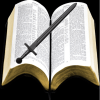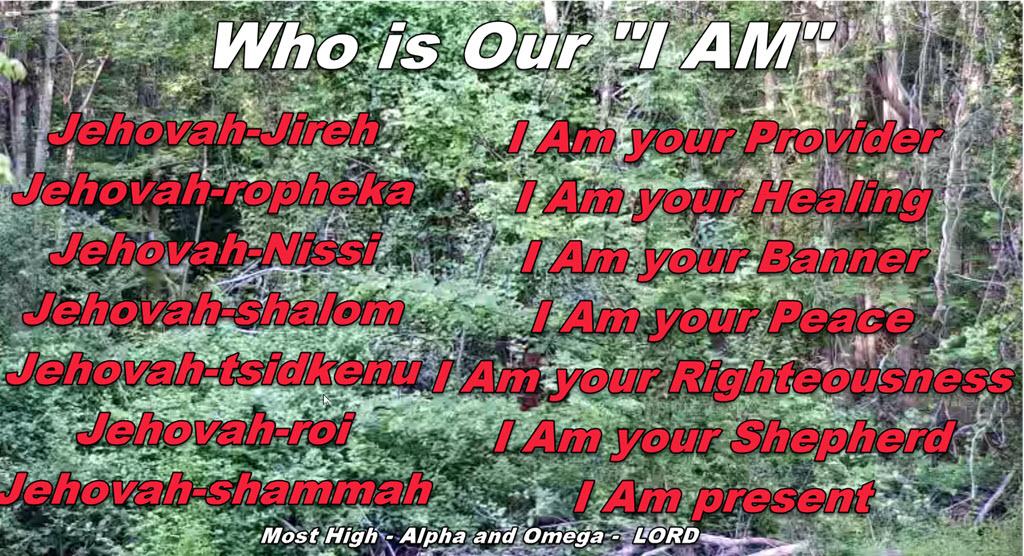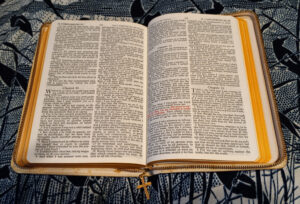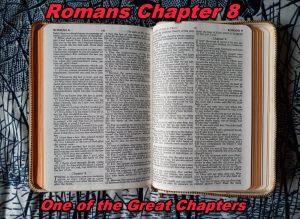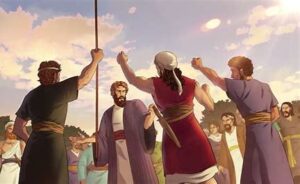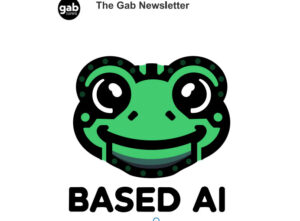Les Feldick study on I AM
Book 4 from Les Feldick our various names of Christ in the Old Testament, in the Book of John, Revelations 22. and other places. His declaration in Exodus” I AM THAT I AM” to Moses we remember hearing many times. To me these places show that our Sovereign God clearly Inspired this book from Cover to Cover,
Jesus said unto them, Verily, verily, I say unto you, Before Abraham was, I am.
John 8:58
There is No Question on Who I AM is after this Study. Les Goes into more detail the Most HIGH and other thoughts on deity. Please read or watch all of Book 4.
Once Les covers the “I AM” he then goes into the “Most High” covering a deity name used with Gentiles. Very exciting study of Our Sovereign God.
LESSON TWO * PART I
NAMES OF DEITY, MOST HIGH
Please turn with me to Genesis 14 again. For review, we reached where Abraham and Lot had separated. Lot had pitched his tent toward Sodom. Abraham remained up in the central part of what we now know as Israel – up in the highlands. After Lot was settled in Sodom, some kings from other tribes to the east came in and overran Sodom, taking everyone captive with them, and heading north. This is what happened to the cities of Sodom and Gomorrah. Abram had enough of his hired help that he could raise a small army out of his own people – 318 men. They pursued these conquerors of Lot and his fellow Sodomites. Abram overcame them, defeated them and took all the spoil. As he is returning to the area of more or less central, or southern Israel in the area where we now know Jerusalem exists, he came across a person the Scripture introduces as the high priest of Salem. The word `Salem’ is the last five letters of the word `Jerusalem.’ So it is the same area today, although it was not a city back in those days. From the area of Jerusalem comes this priest of the Most High God, Melchizedek. He has aroused more questions over the years from my class than anything in Scripture. So we are going to take the time to identify him, and the purpose of his meeting with Abram.
Genesis 14:17,18
“And the king of Sodom went out to meet him, after his return from the slaughter of Chedorlaomer, and of the kings that were with him, at the valley of Shaveh, which is the kings dale. And Melchizedek king of Salem brought forth bread and wine: and he was the priest of the most high God.”
I’m going to give you the most absurd illustration I can think of because I want to make a point. Imagine that we have a beautiful, very expensive Swiss watch laying on a table; as expensive a watch as you can buy. Expensive, not only because of its gold casing, but because of the inner workings. Picture a watch that is so complicated, and is so meticulous in its makeup that the average watchmaker wouldn’t attempt to fiddle with it. Then picture an old $5 Big Ben alarm clock. I don’t even know if they make them anymore; that old, big, round alarm clock which you wind up and sounds like a piece of machinery as it ticks off the minutes. Set them side by side on the table. Now, get a vivid picture of this; the tremendously expensive, exquisite, meticulously made Swiss watch over against this old, cheap $5 alarm clock. Now take your imagination one step further. Let’s assume that some great, famous jeweler who is known for his trade comes along. With all the arrogance at his disposal, and with all the pomp and circumstance he picks up the watch, lays it down and says, “Well. there’s not a nickel’s worth of difference between this watch and this clock.” And you say, “That’s absurd!” It would be! Remember that, we’re going to come back to it.
In verse 18 of Chapter 14 that Melchizedek was the priest of Whom? The most High! Since Genesis 1:1 you’ve never seen that term used before, have you? Remember that the Bible is a progressive revelation. Go back with me to Genesis Chapter 1. All the way through this Chapter we have the three-letter word, `God.’ `God’ did this and `God’ said that. That’s the only term of Deity we find throughout the whole chapter. Suddenly, in Genesis 2:4 we come to a different term of Deity. It’s no longer just `God’, but The `LORD God.’ Be careful as you look at the word `LORD;’ it is all capitalized. Be aware of this as you go through Scripture as there it a lot depending on this. Beginning back in Chapter 1, the God of that Chapter is known in the Hebrew as `Elohim.’ When we were in Genesis 1, we equated El Elohim with the Trinity of God The Father, God The Son, and God The Holy Spirit.
El Elohim is a plural word in the Hebrew. It had to be plural to envelop all three Persons of the Godhead. In Chapter 2, the term is no longer just `God.’ but `LORD God,’ all capitalized. It would still be Elohim, or as Chapter 1 would call Him, `God.’ Now, Who is The Lord God? We have equated it before as `He is Jehovah.’ And Jehovah is God the Son. All of this is for a purpose. After the first chapter of the restoration of creation, man now fills the scene. God knows there will have to be a plan of redemption (because God knows what man is going to do); but not only a plan of redemption, but also a Person of the Godhead Who could continue to communicate with His created beings. Remember in those earlier chapters when we were in John’s Gospel.
John 1:1 & 14a
“IN the beginning was the Word, and the Word was with God, and the Word was God.”
“And the Word was made flesh…”
That all refers to God the Son, Who now is fulfilling the role of the plan of redemption, and His name becomes Jehovah. LORD and Jehovah are always synonymous. Throughout the Scripture we find that even though Jehovah is the God of all, we see that Abraham addresses Him as Jehovah, The Most High (even in Genesis, Chapter 14). Yet, we must separate them in order to see what the Bible is saying. After Genesis Chapter 2 and God deals with the whole human race in the person of Jehovah, or The Lord, the terminology is always now – The LORD, The LORD. Abraham appears in Genesis Chapter 12, Jehovah then becomes intrinsically the God of Abraham, or the Person of the Godhead Who is particularly dealing with the Nation of Israel. So, when the Bible says, `the God of Abraham,’ and `the God of Isaac,’ Who is it referring to? Jehovah! Remember, too, He is still God the Son. Continuing in Genesis we find Jehovah becomes everything the Nation of Israel could hope for in all of their physical and spiritual needs.
Turn to Genesis, Chapter 22. We find that Abraham is acquainted with Jehovah with an extra name behind Him. In this case it is Jehovah-Jireh. We’ve never seen that before. Jehovah-Jireh was the God who provided the sacrifice when He spared Isaac. You remember the story how God stayed Abraham’s hand and kept him from sacrificing Isaac. What did Abraham see in the thicket when he turned around? … the ram! So, Abraham called Him Jehovah-Jireh because Jehovah provided the sacrifice. Study that whole chapter.
As Israel comes out of Egypt under Moses, the first thing God promises them (Israel) is that if they will be obedient He will be their healing. You’ll find that as Jehovah-ropheka, Who would be their Healer. This would be predominately in the physical area; as He said, “None of these diseases that were in Egypt will come upon you.” So He became their Healer; however, it is implied for the spiritual as well. We find that in Exodus, Chapter 15. In Exodus, Chapter 17, we find the term Jehovah-Nissi. Israel has finally come up against their first opposition – the Amalekites. Having left Egypt they were on their way to Sinai, and were fighting the Amalekites. As long as Moses held his arms up, the battle went for Israel. As soon as they came down, the battle went against Israel. Who came to his aid? Aaron and Hur held his arms up until the battle was won. When it was over they declared that God was their Jehovah-Nissi. He was their banner. I guess today we could say He was their flag. He was the very One who gave them the emotional uplift. He was the One who kept them pressing on.
As we continue in Scripture we come to the term Jehovah-Shalom, which in Hebrew is peace. That is given to Gideon in Judges, Chapter 6. Again, Israel has now come to a point of decline. They have gone after false gods – and the Midianites from the east are overrunning their crops, and taking their children captive. So Israel began to cry to Jehovah for help. You know He raised up Gideon. He told Gideon the only way to achieve peace was to turn back to Jehovah and defeat the Midianites with His help; then, indeed, they could have `Shalom,’ and `peace.’ In Psalms 23, the word is `roi.’ – Hebrew for shepherd. You know the verse: “The Lord is my Shepherd.” In the Hebrew it is Jehovah-roi; I am your Shepherd. Again, it is an intrinsic need of the Nation of Israel.
We come to two more: Jehovah-tsidkenu – He is their Righteousness. They had none without Him. He would one day be all the righteousness Israel would need as He would set up His kingdom. Study Jeremiah 23. You’ll see these as you read that particular chapter and setting. The final one of the seven is that He would be Jehovah-shammah. This has reference to when He sets up His kingdom, He will be present. You’ll find that in Ezekiel 48. God does everything in sevens, doesn’t He? Seven distinct needs of Israel all fulfilled by a seven-fold operation of Jehovah:
- Jehovah-Jireh
- Jehovah-ropheka
- Jehovah-Nissi
- Jehovah-shalom
- Jehovah-tsidkenu
- Jehovah-roi
- Jehovah-shammah
In the Gospel of John, there are again seven instances of Jesus using the `I Am.’ Remember, Jehovah stands for the I Am:
- I Am your Provider
- I Am your Healing
- I Am your Banner
- I Am your Peace
- I Am your Righteousness
- I Am your Shepherd
- I Am present
Jesus uses the same `I Am’ seven times in the Gospel of John. I won’t tell you where they are but I’ll give you a little hint. I Am the Way, the Truth and the Life. (I’ll call that `one’ I Am.) I Am the Bread of Life. I Am the True Vine. I Am the Resurrection and so forth. You’ll see that again seven times, even as He fulfills the need in Israel, Jesus speaks of fulfilling those same types of seven things. Then, eight in Scripture always speaks of the finality after the seven of completion.
You’ll find the eighth one in the Book of Revelation, Chapter 22. Close to the end you have the final `I Am.’ I Am Alpha and Omega, the Bright and Morning Star. When do you see the morning? In the Book of Revelation, it is the dawning of the eternal day. Chapters 21 and 22 are dealing with eternal things. You can follow this from Genesis all the way through the Old Testament. Jesus picks it up in the New Testament and then it finally ends at the dawn of eternity, the Bright and Morning Star. Let’s go back to Exodus, Chapter 3 where Moses is at the burning bush. I’m trying to build the basics for explaining my ridiculous illustration at the beginning of the lesson.
Exodus 3:13,14
“And Moses said unto God, `Behold, when I come unto the children of Israel, and shall say unto them, The God of your fathers hath sent me unto you; and they shall say to me, What is his name? what shall I say unto them?’” Moses could anticipate their asking what His name was because in Egypt every god had a name. Moses was correct – “Yes, they will ask me Who this God is You’re talking about and what His name is.”
“And God said unto Moses, `I AM THAT I AM:’ and he said, `Thus shalt thou say unto the children of Israel, I AM hath sent me unto you.’” See the `I Am’ again – the `Jehovah’ – `I Am That I Am?’ Turn to John’s Gospel Chapter 8. The Jews have been trying to get Jesus in a corner, trying to trick Him to prove He was an imposter, a blasphemer, and not Who He said He was.
John 8:52-57
“Then said the Jews unto him, `Now we know that thou hast a devil. Abraham is dead, and the prophets; and thou sayest, If a man keep my saying, he shall never taste of death. Art thou greater than our father Abraham, which is dead? and the prophets are dead: whom makest thou thyself?’ Jesus answered, `If I honour myself, my honour is nothing: it is my Father that honoureth me; of whom ye say, that he is your God: Yet ye (remember He is talking to the religious leaders of Israel) have not known him; but I know him: and if I should say, I know him not, I shall be a liar like unto you: but I know him, and keep his saying.’” Watch this next verse: “Your father Abraham rejoiced to see my day: and he saw it, and was glad.”Then the Jews clearly realized that He was claiming to be the very God of Abraham, the I AM, and it infuriated them! “Then said the Jews unto him, `Thou art not yet fifty years old, and hast thou seen Abraham?’”
Now, Who is He claiming? He’s Jehovah! He’s the same I AM Who has been eternally existent. I want to make my point on my illustration before we close this chapter. Go back to Genesis 14, where we have another term of Deity. Only now instead of LORD God or Elohim, it’s The Most High. We haven’t seen this before, but this Melchizedek is the priest of The Most High, and is the king of Salem. Israel is not yet on the scene. She has been promised in the Abrahamic Covenant, but as yet, there is no Israel. So who are the people dwelling in the area of Salem? Non-Jews, or Gentiles. So this term Most High God is always associated in Scripture with the Gentile as opposed to being associated with Israel. Turn with me now to Deuteronomy, and let me make a point.
Deuteronomy 32:7-9
“Remember the days of old, consider the years of many generations: ask thy father, and he will shew thee; thy elders, and they will tell thee. When the Most High divided to the nations (plural – not Israel, but to the Gentile nations) their inheritance, when he separated the sons of Adam, he set the bounds of the people according to the number of the children of Israel. For the Lords portion is his people; Jacob is the lot of his inheritance.”
I’m trying to point out the term `Most High’ is applying to whom? The non-Jew; the Gentile world! Go to the Book of Daniel. Daniel is a book of prophecy concerning the Gentile nations. You can almost anticipate what I am going to tell you. The constant reference to God in Daniel is The Most High. Here are a couple of examples, concerning king Nebuchadnezzar – Daniel is speaking.
Daniel 4:17a
“This matter is by the decree of the watchers, and the demand by the word of the holy ones: to the intent that the living may know that the most High ruleth in the kingdom of men (not Jehovah – the Most High)…”
Daniel 4:24a
“This is the interpretation, O king, and this is the decree of the most High,…” Now come over to Chapter 5.
Daniel 5:18a
“O thou king, the most high God gave Nebuchadnezzar thy father a kingdom (Gentiles)…”
What I want you to understand is that as Jehovah is intrinsically and primarily the name of God with regard to Israel and redemption; this term Most High (which in the Hebrew is El Elyon) is applying to the non-Jew, or the Gentile world. We’re not going to have time to explain any more in this lesson. So, in the next chapter, I will be explaining my absurd illustration.
Les Feldick Book 4-2-1
In ending this study, Your Faith in this I AM will grow.
Other Articles 2 Rightly Divide the Word What’s Imputed by Faith to Every Believer What does the Bible say about Salvation? and externally these websites http://pray4usa2day.com .
